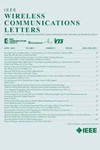Paper accepted in IEEE Wireless Communications Letters

C. Lameiro, I. Santamaría, and P. J. Schreier, "Benefits of Improper Signaling for Underlay Cognitive Radio", IEEE Wireless Communications Letters, 2014, DOI 10.1109/LWC.2014.2360179
Abstract: In this letter we study the potential benefits of improper signaling for a secondary user (SU) in underlay cognitive radio networks. We consider a basic yet illustrative scenario in which the primary user (PU) always transmit proper Gaussian signals and has a minimum rate constraint. After parameterizing the SU transmit signal in terms of its power and circularity coefficient (which measures the degree of impropriety), we prove that the SU improves its rate by transmitting improper signals only when the ratio of the squared modulus between the SU-PU interference link and the SU direct link exceeds a given threshold. As a by-product of this analysis, we obtain the optimal circularity coefficient that must be used by the SU depending on its power budget. Some simulation results show that the SU benefits from the transmission of improper signals especially when the PU is not highly loaded.

